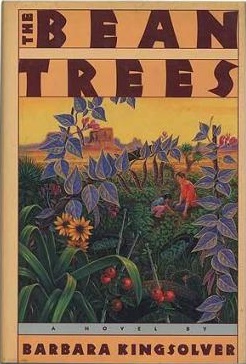Barbara Kingsolver’s first novel,
The Bean Trees, became a bestseller, and has been followed by many other novels, as well as non-fiction writings. It is an unusual, even an unorthodox adoption story. The narrator is a young woman who grew up in rural Kentucky, the heart of Appalachia, in the fictional county of Pittman. This writer had ancestors in Kentucky and distant relatives still there, and it was easy to picture the scenery and the characters of this story. Named Narietta and called Missy, she was determined to eventually change her name entirely. She manages to get a job, while still in high school, at the local hospital lab, counting platelets and a few other procedures. She graduates and continues working, eventually saving up two hundred dollars, while helping her mother with rent and groceries. She takes the two hundred dollars and buys a 1955 Volkswagen bug with “no windows to speak of, and no back seat and no starter.” She leaves home, as she has always wanted to do, and heads west. She decides to change her given name to whatever town she lands in. “I would drive west until my car stopped running, and there I would stay.” She gets to Taylorville the first night and decides she will be Taylor Greer from then on. She eventually gets to Tucson, Arizona, where two of her tires wear out on the freeway off-ramp, next to the “Jesus Is Lord Used Tires” business. There she stays. However, along the way, in Oklahoma, an old lady puts a baby in the back of her car and insists she must take this child. She gives no reason, no name for the child, not even the child’s gender, and no information about herself, except that the baby is her dead sister’s, and was born in a Plymouth. The child appears to be Native American and they are on or near the Cherokee Nation. So begins the gradual adoption story.
This book is so unusual, so well-written, that the reader may stay up late reading it, just to see what happens next. Taylor gets to Tucson and is stuck with no money for tires, so she begins changing tires and other basic car maintenance for the woman who runs “Jesus is Lord Used Tires.” She meets up with another young woman from Kentucky, from an equally poor background, and they wind up living together out of necessity, raising their children together, and forming an informal family. The other woman, Lou Ann, has been married, but the husband left before their baby, a boy named Dwayne Ray, was born. Taylor’s acquired child is a girl, who gradually comes to be called Turtle. There are many twists and turns along the way in this story, and surprises too good to reveal in this review, except to say Taylor eventually does adopt Turtle.
Although this is not a new book, it is a lot of fun to read and may lead readers to question their own ideas about what constitutes a family, and even what adoption means. Parts of the story, as it is told, may remind one of Fried Green Tomatoes. Mostly, it’s fun to read in this time when we may feel isolated and we’re not having a lot of fun. This book was re-discovered by Amy Butel, who thoroughly enjoyed it and passed it along. Look for it at used book stores or on Amazon.
